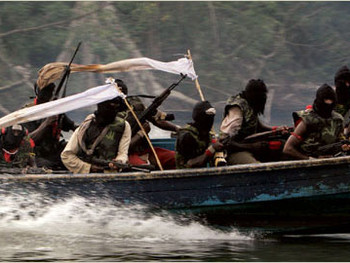
The recent spike in piracy in the Gulf of Guinea, off the west coast of Africa, has caused the United States to consider action to combat this kind of crime. Besides the danger to the shipping industry and human life, the U.S. is increasingly worried that gangs of pirates have direct or indirect ties to terrorist networks.
Identifying sources of funding for terrorist organizations — al-Qaeda affiliates in particular — is a key step in mitigating their operational capacity. Piracy in the Gulf of Guinea is a lucrative business: Pirates have recently stolen $5 million in cargo from a fuel tanker traveling from the Ivory Coast. They also regularly kidnap employees of international oil and shipping companies, which are forced to pay a hefty ransom for their human capital. Stealing oil, though, remains the best option for pirates, as they can cash-in in as little as a week if they have a pre-arranged buyer.
And it’s the buyers that concern the United States. While Nigerian insurgent groups such as Boko Haram may be purchasing materiel from pirates, it is also quite possible that they purchase black-market oil on the cheap, and turn it over to make a quick-but-significant buck. And while Boko Haram is currently a violent problem only in the local northwest African region, it is their recent coordination and suspected links to the international terrorist organization al-Qaeda in the Islamic Magrhreb that has the United States concerned.
Although the international links are far from certain, Boko Haram’s ideology is concerning. Like many jihadist organizations, their stated aim is to establish an Islamic Caliphate, instate Sharia law, and wage war on Western influence. In fact, their name means “Western education is sinful” in local tongue. Only deemed a terrorist organization by the U.S. in 2013, Boko Haram has the potential to become an international problem if they aren’t nipped in the bud.
Cutting off a group’s financial sources remains one of the most affective ways to blunt an organization’s growth, which is why the United States is taking a hard look at employing similar counter-piracy efforts as they did in the east of Africa.
No final decisions have been made yet, and several obstacles stand in the way: Local governments are pridefully reluctant to yield part of their sovereignty to foreign forces, and on the other end, recent U.S. military budget cuts make it difficult to marshal the proper forces. The U.S. Navy is in the middle of a force-reduction and a pivot to Asia, which means there may be little to provide for counter-piracy efforts in West Africa.
However, U.S. commanders remain vocal, warning that the threat of piracy is quickly spreading away from just Nigeria and that the sickness may soon infect the entire region. Even if there is no overt link between terrorists and pirates (indeed, there may never be– but that doesn’t mean one doesn’t exist), allowing a culture and economy of criminality creates a continent-wide breeding ground for terrorists.
Absent international action, shipping companies will be forced to hire private security firms — a strategy that yielded much success in the east — to secure their employees and cargo.